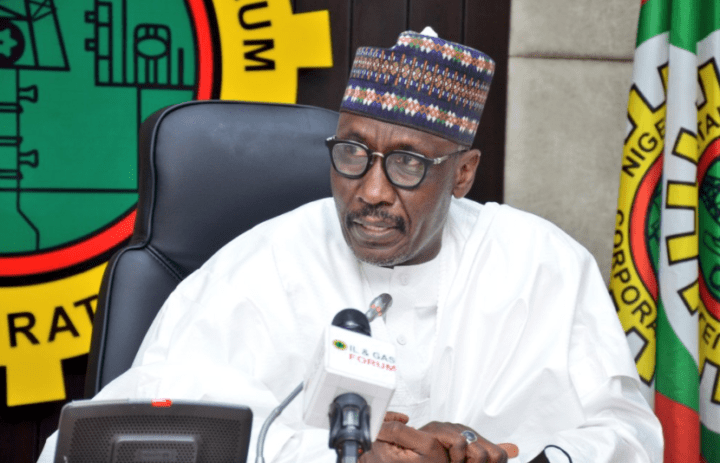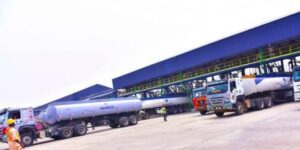


Subsidy: Petrol smugglers made N17m per truck before removal — NNPC Ltd
..Illegal refineries supplied total diesel consumed in the country
…Direct purchase from Dangote refinery, importation will crash petrol price — Marketers
By Seun Ibiyemi
The Group Chief Executive Officer of the Nigerian National Petroleum Corporation (NNPC) Limited, Mele Kyari, has revealed that petrol smugglers exploited subsidy loopholes, making around N17 million per truck in neighbouring countries.
Kyari made this disclosure while addressing journalists in Abuja on the government’s efforts to deregulate the oil and gas sector.
He explained that cross-border smuggling was rampant due to the fuel subsidy, with a 6,000-litre truck netting smugglers no less than N17 million per trip.
Kyari noted, however, that the same truckload would generate no more than N500,000 if sold within Nigeria, for instance, in a state like Borno.
He further stated that the country has stopped losing such revenue to smuggling since the subsidy was removed, as fuel prices are now adjusted to reflect their true market value.
“In the last 47 years, PMS has always been subsidised and subsidy is creating arbitrage that means there is a difference between price in one location, lower than what it should be in another location.
“And when Mr. President announced subsidy in June. What he did was recalibrate the price. There is no longer any value in anyone taking the product across the border. If you do, you’re not going to make those profits.
“In a 6,000 litre truck, you can actually gain up to N17 million from just one truck. How are you going to stop someone who with two trips can just easily make N17 million times two—which is the price of the truck itself.
“However, when you take a truck legally, maybe N8 million, say, to Maiduguri, the legitimate value you have is less than N500,000. Why will I see N17 million and then take all the trouble to go to Maiduguri, keep it in the fuel station for one month and then make N3 to N4 million. So you see, as long as you are not in a subsidy regime, you won’t lose money,” Kyari said.
He added that without the subsidy regime, Nigeria no longer loses vast sums of money to fuel smuggling.
…Illegal refineries supplied total diesel consumed in the country
Also, the Group Chief Executive Officer (GCEO) of the NNPCL, Mr. Mele Kyari stated that illegal refineries at a time supplied the total diesel consumed in the country.
He said this in an interview on Channels Television, Business Morning program where he commented on efforts to tackle insecurity and crude oil theft across the Niger Delta.
According to him, at a particular time, diesel importation into the country was near zero while there was no diesel scarcity meaning that the total consumption was from these illegal refineries.
He noted that there were over 20,000 pits dotted across the region responsible for crude oil theft but the scale has reduced over time due to efforts of security agencies.
In his words, “When we started this process of deactivation in 2022, we deactivated 8,684 illegal refineries. They are not refineries really, just boiling points, we don’t know what name to call them. Then you have integral connections to the pipeline, we had 6,610 illegal connections to the pipeline, and we have removed about 5,913, which means we still have over 1000 that have not been removed and they are there, they connect every day that we remove.
“At a point, you may not be aware, imports of AGO in the country were almost nil and there was no scarcity of AGO in the country. They are all actually boiling and at a point everywhere you go, it is the same AGO that is coming from these creeks that we are using all over the country.”
He also noted that efforts of the federal government through security operatives have achieved significant results going by the decline in illegal refineries being destroyed across the Niger Delta.
The ongoing issue of oil theft in the Niger Delta continues to be a major challenge, with military forces frequently discovering new illegal operations each week. This poses a serious problem for the Federal Government, as Nigeria struggles to meet its OPEC quota due to widespread oil theft.
In 2024 so far, Nigeria has consistently failed to meet its OPEC oil production quota of 1.5 million barrels per day severely impacting revenues and foreign exchange accruals.
The Ministry of Petroleum Resources has set a target of 2 million barrels before the end of the year.
As part of efforts to increase production and stem theft, the federal government engaged local security contractors to check against the activities of oil thieves but the degree of impact of that engagement remains to be seen.
…Direct purchase from Dangote refinery, importation will crash petrol price — Marketers
The National Secretary of the Independent Petroleum Marketers Association of Nigeria (IPMAN), James Tor, has said petrol prices may drop after the federal government allowed marketers to buy directly from Dangote refinery and import from other sources.
He made this statement in an interview while speaking on the recent deregulation effort by the federal government to allow marketers to directly negotiate petrol prices from Dangote Refinery.
He said this move would end the Nigerian National Petroleum Corporation (NNPC) Limited’s monopoly as the sole purchaser of petrol products in the country.
He also mentioned that the federal government has not only approved direct purchases from Dangote but also allowed imports from other sources.
“I can say yes (that petrol price will decline) because there will be numerous places to get the product. When people selling the product are many, definitely they will come down with the price.
“And we that are selling it, we go for the person that is selling less, so there must be a decline. Presently, where NNPC is, the monopoly of handling everything, that is where the problem is. If they allow us to get it from Dangote refinery, after my president’s speech, we had a meeting and it was agreed that they will now allow marketers to get their products directly from Dangote refinery. And not even stopping on that, they have now agreed that they will give us a licence to import.
“By doing so, we believe and are very confident, because we have partners in the country and outside the country that we can partner with. And we have the products at affordable prices. After all, Nigerians are our people,” Tor said.


